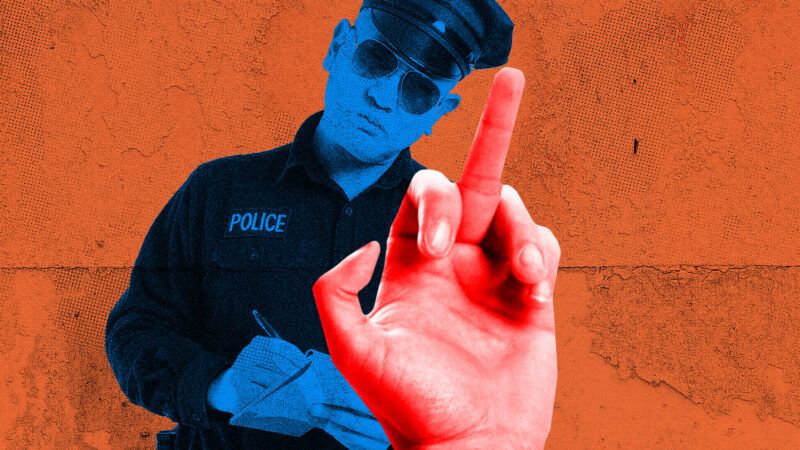Kentucky Bill Would Make Insulting a Cop a Crime
Courts have widely upheld the First Amendment right to hurl choice words or gestures at police.

Kentucky lawmakers advanced a bill Thursday that would make insulting or provoking a police officer a crime.
The legislation, Senate Bill 211, passed out of a Senate committee by a 7-3 vote, according to the Louisville Courier-Journal. The bill would make it a misdemeanor offense for someone to taunt "a law enforcement officer with offensive or derisive words, or by gestures or other physical contact, that would have a direct tendency to provoke a violent response from the perspective of a reasonable and prudent person."
The Kentucky bill is one of several introduced by state legislatures around the country aiming to crack down on anti-police protests following the national unrest over the police killing of George Floyd last year. In Florida, for example, Republican Gov. Ron DeSantis introduced legislation last September to enhance criminal penalties for protest-related crimes and block state funding to cities that cut their police budgets.
"In these riots, you see people getting up in officers' faces, yelling in their ears, doing everything they can to provoke a violent response," the Kentucky bill's sponsor, state Sen. Danny Carroll (R–Benton), told The Courier-Journal.
"This is not about lawful protest in any way, shape, form or fashion," Carroll continued. "This country was built on lawful protest, and it's something that we must maintain—our citizens' right to do so. What this deals with are those who cross the line and commit criminal acts."
The American Civil Liberties Union of Kentucky called the legislation "an extreme bill to stifle dissent." The law, if enacted, would no doubt be challenged on First Amendment grounds.
There's in fact a significant body of First Amendment and Fourth Amendment case law generated by cops retaliating against people who hurt their feelings—most of it firmly upholding the right to hurl choice words or gestures at public officials.
In 2012, the U.S. Court of Appeals for the 2nd Circuit ruled in favor of a New York man who sued after he was arrested for disorderly conduct after flipping off a cop. The court held that the "ancient gesture of insult is not the basis for a reasonable suspicion of a traffic violation or impending criminal activity." (However, the 2nd Circuit would later dismiss a lawsuit by a man who was arrested after writing "fuck your shitty town bitches" on a mail-in traffic ticket.) In 2013, the U.S. Court of Appeals for the 6th Circuit, which covers Kentucky, ruled in favor of a woman who was pulled over and ticketed for flipping off an officer. The 6th Circuit first upheld the free speech right to shout "fuck you" and flip off a police officer from a moving vehicle in 1997, drawing on the Supreme Court's famous 1971 decision in Cohen v. California, which upheld the right of a man to wear a jacket that said "fuck the draft" into a courthouse.
Despite this, similar cases keep popping up. In 2019, an Iowa man won a lawsuit after he was charged with third-degree harassment for posting on Facebook that a sheriff's deputy was a "stupid sum bitch" and "butthurt." Just last month, the U.S. Court of Appeals for the 8th Circuit denied qualified immunity to a Minnesota police officer who pulled over and arrested a man for flipping her off.
The Kentucky legislation is ill-conceived, probably unconstitutional, and would simply give police another tool, in addition to old standbys such as obstruction of justice and disorderly conduct, to ticket people for what's known as "contempt of cop." This has already played out in other states, such as Pennsylvania, where The Appeal reported in 2018 that police were using hate crime laws to charge people with "ethnic intimidation" for insulting them. Such prosecutions have no place in a country of citizens, rather than subjects.
As Supreme Court Justice William J. Brennan Jr. wrote in 1987, in a ruling striking down a Houston ordinance that made it unlawful to oppose or interrupt a police officer, "The freedom of individuals verbally to oppose or challenge police action without thereby risking arrest is one of the principal characteristics by which we distinguish a free nation from a police state."


Show Comments (57)